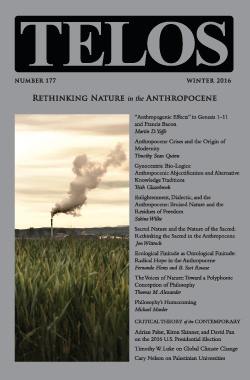Timothy Sean Quinn’s “Anthropocene Crises and the Origin of Modernity” appears in Telos 177 (Winter 2016), a special issue on “Rethinking Nature in the Anthropocene.” Read the full article at the Telos Online website, or purchase a print copy of the issue in our online store.
 The term “Anthropocene” designates the present age of the world, dominated and transformed by human activity. It is therefore an age of crisis, whose central features include not only technological exploitation of the earth, but also a loss of faith in any order, natural or supernatural, that could serve as a guide to human affairs. In this essay, I wish to argue, first, that the roots of this crisis rest with the modern concept of nature, a concept of nature that, as Hans Jonas wrote, “contained manipulability at its theoretical core.” The essay further wishes to locate the origin of this concept of nature in Francis Bacon’s and Rene Descartes’ appropriation of Machiavellian notions of fortuna and virtú. Understanding these Machiavellian origins is crucial for identifying dangerous tensions within Baconian and Cartesian notions of nature: between nature scientifically understood, as system of blind mechanical forces, and as humanly experienced, hostile to humanity. Finally, this essay wishes to draw out the political implications of this concept of nature, as they play out especially in Francis Bacon’s New Atlantis. By uncovering the political origins of the modern scientific concept of nature, in short, this essay wishes to clarify the ways in which modern natural science has acquired a provisional character, wherein knowledge of nature is but a means to ends directed by human passions. In this fashion, the essay hopes to place the dilemmas faced by any thoughtful consideration of the Anthropocene into relief.
The term “Anthropocene” designates the present age of the world, dominated and transformed by human activity. It is therefore an age of crisis, whose central features include not only technological exploitation of the earth, but also a loss of faith in any order, natural or supernatural, that could serve as a guide to human affairs. In this essay, I wish to argue, first, that the roots of this crisis rest with the modern concept of nature, a concept of nature that, as Hans Jonas wrote, “contained manipulability at its theoretical core.” The essay further wishes to locate the origin of this concept of nature in Francis Bacon’s and Rene Descartes’ appropriation of Machiavellian notions of fortuna and virtú. Understanding these Machiavellian origins is crucial for identifying dangerous tensions within Baconian and Cartesian notions of nature: between nature scientifically understood, as system of blind mechanical forces, and as humanly experienced, hostile to humanity. Finally, this essay wishes to draw out the political implications of this concept of nature, as they play out especially in Francis Bacon’s New Atlantis. By uncovering the political origins of the modern scientific concept of nature, in short, this essay wishes to clarify the ways in which modern natural science has acquired a provisional character, wherein knowledge of nature is but a means to ends directed by human passions. In this fashion, the essay hopes to place the dilemmas faced by any thoughtful consideration of the Anthropocene into relief.








